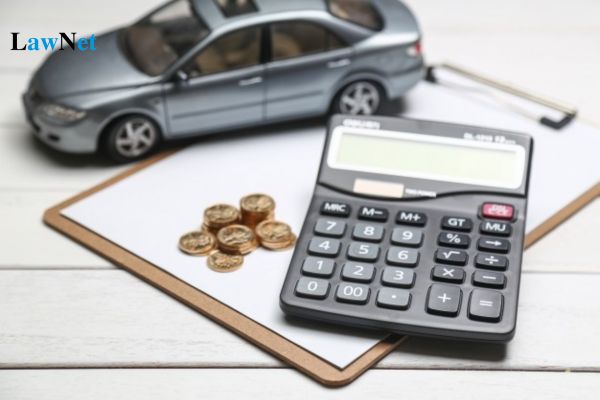Are hearses subject to excise tax in Vietnam?
Are hearses subject to excise tax in Vietnam?
According to the provisions in Clause 4, Article 3 of the Law on excise tax 2008, there are five types of automobiles that are exempt from excise tax, including:
(1) Ambulances.
(2) Prisoner transport vehicles.
(3) hearses.
(4) Vehicles designed to carry both seated and standing passengers with a capacity of 24 people or more.
(5) Cars operating in amusement parks, entertainment venues, or sports areas that are not registered for public road use and do not participate in traffic.
Thus, hearses are not subject to excise tax.

Are hearses subject to excise tax in Vietnam? (Image from the Internet)
Are hearses exempt from road user charges in Vietnam?
Based on the provisions in Clause 3, Article 3 of Decree 90/2023/ND-CP, road user charges are exempt for those paying fees for funeral service vehicles, including:
Exemption Cases
road user charge exemption for the following types of vehicles:
1. Ambulances.
2. Firefighting vehicles.
3. Funeral service vehicles, including:
a) Specialist structured vehicles for funeral services (including hearses and refrigerated trucks used to preserve and transport corpses).
b) Related vehicles serving funeral services (including vehicles transporting mourners accompanying the hearse, trucks carrying flowers, vehicles escorting photographs) which are exclusively used for funeral services with vehicle registration certificates in the name of funeral service units. The funeral service unit has a declaration of commitment stating these vehicles are only used for funeral activities, which must be submitted to the registration unit during vehicle inspection (specifying the number of vehicles and license plates by each type).
4. Specialist vehicles for defense purposes, including vehicles with red license plates and embossed white letters and numbers equipped with specialized defense equipment (including tank trucks, cranes, troop carriers defined as vehicles with 12 seats or more, covered transport vehicles equipped with seats, control vehicles, military inspection vehicles, vehicles transporting prisoners, rescue vehicles, satellite communication vehicles, and other specialized vehicles serving defense purposes).
5. Specialized vehicles belonging to units within the organizational system of the people’s public security force, including:
a) Traffic police vehicles with the inscription “TRAFFIC POLICE” on both sides.
b) Police vehicles with 113 inscribed on both sides.
c) Mobile police vehicles with the inscription “MOBILE POLICE” on both sides.
d) Transport vehicles with seats inside the cargo hold of the people’s public security force on duty.
dd) Vehicles transporting prisoners, rescue vehicles, and other specialized vehicles of the people’s public security force.
e) Specialty vehicles (satellite communication vehicles, armored vehicles, anti-terrorism, anti-riot vehicles, and other specialized vehicles of the people’s public security force).
Therefore, according to the regulations, automobiles with specialist structures for funeral services, including hearses and refrigerated trucks used to preserve and transport corpses, are exempt from road user charges.
Additionally, other automobiles serving funeral purposes, such as those carrying mourners accompanying the hearse, trucks carrying flowers, and vehicles escorting photographs, with vehicle registration certificates in the name of the funeral service unit and a declaration of commitment indicating these vehicles are only used for funeral activities submitted to the registration unit during vehicle inspection, are also exempt from road user charges.
What are cases where cars are exempt from road user charges in Vietnam?
According to the provisions in Clause 2, Article 2 of Decree 90/2023/ND-CP, automobiles, tractors, and similar vehicles are exempt from road user charges in the following cases:
- Destroyed due to accidents or natural disasters.
- Seized or registration certificates and license plates revoked.
- Severely damaged to the extent that repair requires 30 days or more.
- Business vehicles belonging to transport enterprises, cooperatives, or transport cooperatives (hereinafter collectively referred to as enterprises) temporarily suspended from circulation for 30 consecutive days or more.
- Vehicles of enterprises not participating in traffic and not using roads within the national traffic system (only issued Inspection Certificates and not Inspection Seals as per regulations on technical safety inspection and environmental protection of motor vehicles by the Ministry of Transport) or vehicles currently participating in traffic and using roads within the national traffic system (issued Inspection Certificates and Inspection Seals per regulations on technical safety inspection and environmental protection of motor vehicles by the Ministry of Transport) transitioning to non-participation in traffic and non-use of roads within the traffic system, exclusively used in the scope of:
+ Driving test centers;
+ Stations;
+ Ports;
+ Mineral extraction areas;
+ Aquaculture, production, and processing areas for agriculture, forestry, and fisheries;
+ Construction sites (transport, irrigation, energy).
- Vehicles registered and inspected in Vietnam but operating abroad for 30 consecutive days or more.
- Vehicles stolen for 30 days or more.

